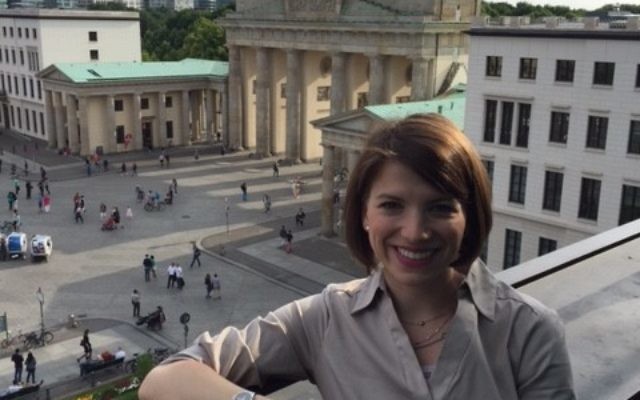Third Generation Rebuilds German-Jewish Relations
By Maddie Cook
I recently returned from a human rights trip to Berlin. As part of the ACCESS Third Generation initiative, I traveled with granddaughters and grandsons of Holocaust victims and survivors and of Nazi soldiers.
The program set out to build trans-Atlantic relations with Germany, and after returning from my 10 days abroad, I can confidently say I have a deep respect for Germany’s commitment to rebuilding a Jewish community and to our Third Generation’s desire to educate ourselves on each other’s histories.
On this diplomatic trip, our group of Jewish-Americans and Germans toured the city of Berlin and experienced the many facets of Berlin’s commitment to always remember. During our Jewish history walking tour of Berlin’s Mitte district, we saw memorials, cemeteries and tributes to the Jewish victims of the Holocaust.
One project, “Stolpersteine,” is an installment of stones embedded in the sidewalks around the city. Each golden stone marks the place a Jewish person was last seen and includes the victim’s name and location of murder.
Walking through the city, we passed by façades where buildings once stood and instead saw plaques with the names of Jewish families who once inhabited those spaces. While these memorials evoke solemn feelings, they serve as constant reminders of Berlin’s past.
Our day trip to the Sachausen concentration camp wasn’t easy. Just 30 minutes north of Berlin, we walked around land once dedicated to imprisoning, humiliating and murdering Jews, homosexuals and other political prisoners. Parts of the tour I wish I didn’t remember, but together our group toured the barracks, the dining hall, the worker fields and the extermination corner of the camp.
I remember forcing myself to read the museum plaques throughout the camp to make sure I knew what happened. I wanted to make sure I remembered this visit to a place I could never have imagined existing, to a place where the darkest depths of humanity existed, to a place that should never exist again.
While we were all silent for most of the tour, emotion erupted when we gathered in a circle and said a prayer. The sound of music tugged at our heartstrings as Germans and Jews stood hand in hand for the Mourner’s Kaddish and El Malei Rachamim. Who would have thought a group of Germans and Jews would join hands and sing in a concentration camp?
While the concentration camp visit was difficult, it was comforting going together, and the experience broke down many of our barriers and united our group. We were strengthened and realized that such moments are building real German-Jewish relations. After that visit, I realized the power and strength of the members in our group.
Later in the day we reflected on the visit, and our conversation reached a whole different dimension. This experience opened us all to our shared history and, oddly enough, made people comfortable enough to reveal their grandparents’ pasts and participation in World War II. The fact that we could all sit in a room and talk about our families’ histories speaks to the strength and power of the Third Generation.
You could say this group is self-selected, but to have the chutzpah to sit, converse and address history is empowering and motivating. These experiences and conversations need to continue.
The members of my trip make me believe in our ability to learn, reflect and build a better world. It takes a lot of courage to study your past, memorialize it and live with it, but I think our Third Generation has the power to do it and manage the direction of our shared future.
Since my return to Atlanta, I’ve wanted to share stories from this trip with others and talk about what I’ve learned. I want to learn ways to continue this conversation and educate the community about stereotypes we maintain.
World War II and the Holocaust will always be difficult subjects. Part of repairing relations is talking about the past and building connections with new and older generations.
Berlin’s commitment to remembering is admirable, and through this program I have met incredible people who are leading the way in educating future generations, building trans-Atlantic friendships, and leading purposeful and intentional lives.





comments